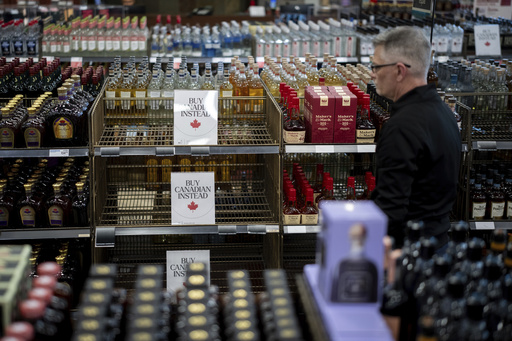
TORONTO — In response to significant tariffs enacted by President Donald Trump, Canada and Mexico have placed retaliatory tariffs on American products, prompting concerns among businesses and consumers about the implications of this escalating trade conflict.
Canada is set to implement a 25% tariff on a wide range of U.S. imports beginning Tuesday, targeting items such as beverages, cosmetics, and paper products valued at 30 billion Canadian dollars (approximately $20 billion). Additionally, a forthcoming list of other goods—including passenger vehicles, trucks, steel, and agricultural products—is anticipated, with an estimated worth of around 125 billion Canadian dollars (or $85 billion).
Trump expressed his willingness to engage with Canadian Prime Minister Justin Trudeau, hinting at a continued dialogue, stating, “We can play the game all they want.” Mexico has not yet specified the exact rates or products included but confirmed it would respond with its own tariffs.
Following Trump’s announcement of a 25% tariff on Canadian and Mexican goods, Trudeau and Mexican President Claudia Sheinbaum held discussions regarding the situation, emphasizing the importance of strengthening bilateral relations. Reports indicate that although Canada and Mexico have been in close communication, a senior Canadian official noted that the responses were not entirely coordinated.
Trudeau encouraged Canadian consumers to support local products, urging, “Now is the time to choose products made right here in Canada.” With Canada being the largest export destination for 36 U.S. states and Mexico being a vital trade partner, the implications of the tariffs could be substantial.
Despite Trump’s warnings of further tariff increases in retaliation for their actions, both Canada and Mexico moved forward with their plans. Trudeau reiterated, “We’re certainly not looking to escalate, but we will stand up for Canada.” Some provinces, including Ontario and British Columbia, are considering removing American liquor brands from shelves in government-operated stores, which could represent significant financial losses for American suppliers.
In Ontario, Premier Doug Ford highlighted that the province sells nearly $1 billion worth of American alcoholic beverages annually. Beginning Tuesday, the Ontario Liquor Control Board will stop stocking American products, severely limiting their availability to local retailers and restaurants.
Public sentiment across the two countries is evolving as individuals seek alternatives to American goods in light of increasing tensions. Trudeau directly addressed American citizens, reminding them that the tariffs “will have real consequences for you.”
Meanwhile, Trump criticized Canada’s trade surplus with the U.S., suggesting that without it, Canada would not remain an independent nation. His comments drew ire from Canadians, who feel betrayed by what they consider an unjustified attack from a close ally. Trudeau reminded the U.S. of the sacrifices made by Canadian soldiers alongside American troops and their assistance during disasters in the U.S.
Notably, Canadian sports fans expressed their frustration with the American national anthem being booed at recent NHL games, an indication of growing discontent. One Raptors fan expressed their disillusionment with the U.S., stating they would consciously avoid American products moving forward.
In Mexico, the government’s response has been muted, but officials emphasize that the country is prepared for the repercussions. The previous administration managed to sidestep tariff threats by tightening immigration controls, but mutual accusations between the two countries have intensified.
Public reactions vary, with some expressing indifference towards potential boycotts of American goods. Others, however, are more committed to supporting such measures. Citizens in border towns are particularly anxious about job security and the repercussions of a prolonged trade conflict on local economies.
The trade dispute arises as Canada enters a challenging political landscape. Trudeau’s Liberal Party is set to announce a new leader soon, coinciding with a likely election in the spring. A frontrunner for the leadership has asserted that Canada will not yield to aggressive tactics from the U.S.
In summary, the rising tariff tensions between the U.S., Canada, and Mexico are creating uncertainties that extend beyond economic circles, affecting consumer behavior and international relations within North America.

